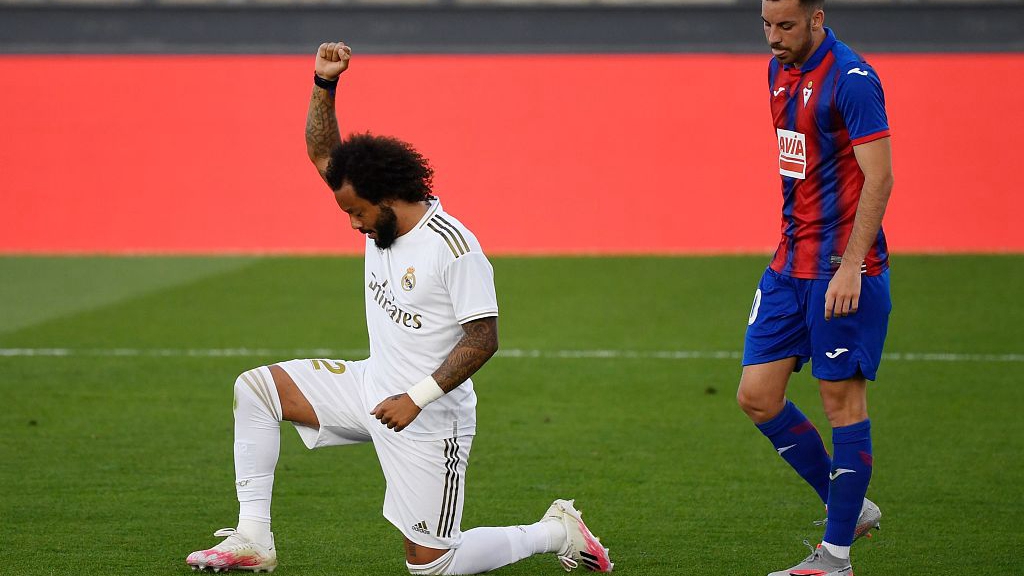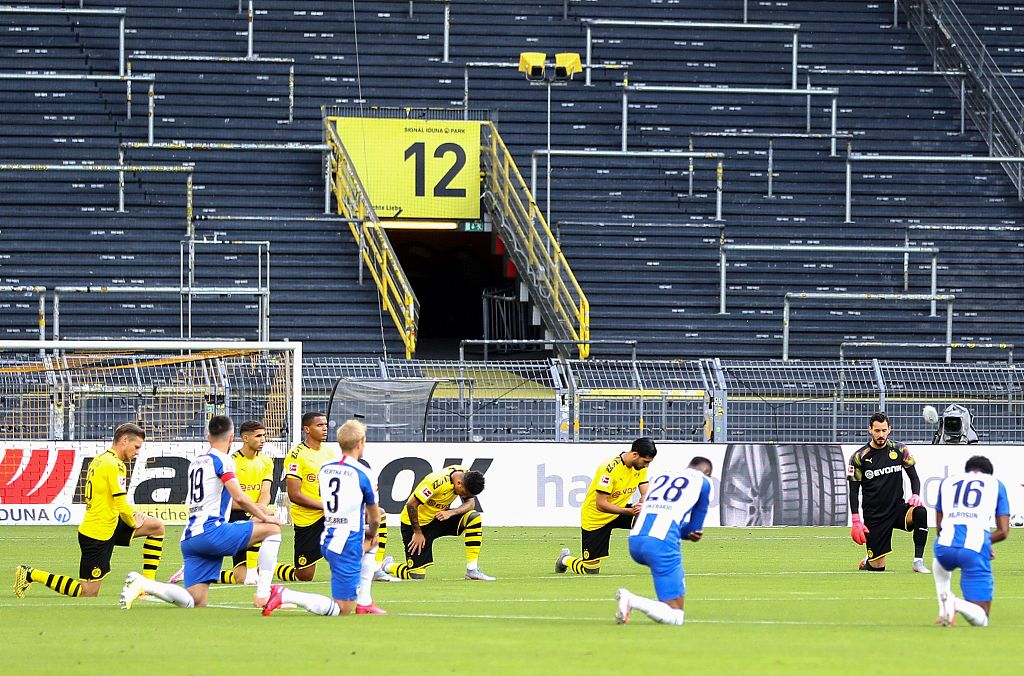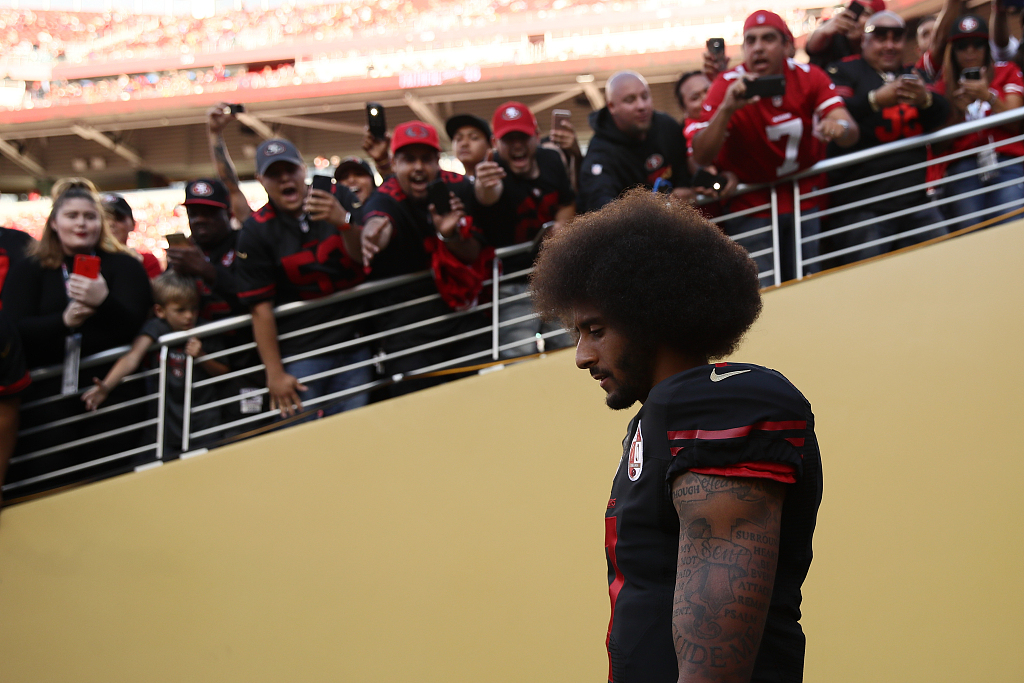
Real Madrid's Brazilian defender Marcelo takes a knee after scoring against Eibar in La Liga at the Alfredo di Stefano Stadium, Madrid, Spain, June 14, 2020. /VCG
Real Madrid's Brazilian defender Marcelo takes a knee after scoring against Eibar in La Liga at the Alfredo di Stefano Stadium, Madrid, Spain, June 14, 2020. /VCG
Right after Marcelo scored an absolute beauty against Eibar, he closed his eyes, dropped onto his left knee and raised his right fist to the heavens.
When former NFL quarterback Colin Kaepernick first knelt during the national anthem to call attention to police brutality and structural racism back in 2016, he immediately endured ruthless boos and condemnation. But now, as the George Floyd protests swelled across the world and injected a fresh sense of urgency, the tide has turned.
Marcelo's public displays of support for the Black Lives Matter (BLM) movement has this time drawn positive reviews from fellow players, coaches, fans and officials. His move took place 37 minutes into Real Madrid's high-profile return to action following La Liga's three-month coronavirus-forced hiatus.
"It's time that an overdue spotlight is shone on the treatment of black people and the racism and violence many encounter in their daily lives," said FIFA Secretary-General Fatma Samoura.
"To all these footballers, I am proud of your commitment to fighting for what is right and I encourage others to add their voices to this important message in the coming days," he added.

Players take a knee in solidarity with protests over the death of George Floyd during the German Bundesliga clash between Borussia Dortmund and Hertha Berlin, Germany, June 6, 2020. /VCG
Players take a knee in solidarity with protests over the death of George Floyd during the German Bundesliga clash between Borussia Dortmund and Hertha Berlin, Germany, June 6, 2020. /VCG
Marcelo is the latest athlete to use the football pitch as a platform to show solidarity with Black Lives Matter, with the likes of Borussia Dortmund's Jadon Sancho, Schalke's Weston McKennie, and Monchengladbach's Marcos Thuram all defiantly spreading anti-racist messages during matches.
Europe's major leagues have confirmed that they wouldn't punish any player who kneels on the pitch despite the fact that those actions violate the International Football Association Board's rules against displaying "any political, religious or personal slogans, statements or images."
"Where any behaviors or gestures on the pitch that may constitute a breach of the Laws of the Game have to be assessed, they would be reviewed on a case-by-case basis with a common sense approach and understanding of their context," an English Football Association spokesman explained last week.
"The power of football can break down barriers across communities and we remain deeply committed to removing all forms of discrimination from across the game we all love."
The only notable exception to the relaxed rules has been the International Olympic Committee (IOC), whose new guidelines in Rule 50 state that political, religious or racial propaganda is not permitted in Olympic Games sites.

The practice of kneeling during the anthem was started by former NFL star Colin Kaepernick in 2016 to highlight racial inequality. /VCG
The practice of kneeling during the anthem was started by former NFL star Colin Kaepernick in 2016 to highlight racial inequality. /VCG
Any possible violations will be investigated by the IOC, the federation that governs the sport involved, and the organizing committee of the nation the person is from. And prohibited acts of protest include "gestures of a political nature, like a hand gesture or kneeling."
The stance of the IOC in potentially punishing athletes who take a knee has sparked huge controversy. "It is a form of control," said U.S. hammer thrower Gwen Berry. "It's kind of like silencing us at the biggest moments of our lives. Which ... I really don't agree with it."
On Sunday, Global Athlete, an international athlete-led movement that aims to inspire change in world sport, also spoke out.
"The IOC and IPC's [International Paralympic Committee] recent statement that athletes who 'take a knee'... will face bans is a clear breach of human rights. Athletes around the globe were awestruck with this statement and demanded change," it said.
"Athletes devote years of their lives to qualify for the Olympic and Paralympic Games. If athletes want to speak up while respecting other rights and freedoms detailed in the Universal Declaration of Human Rights, the IOC should embrace their diverse opinions," it added.
The ball is in IOC's court now. What will be the organization's next move?